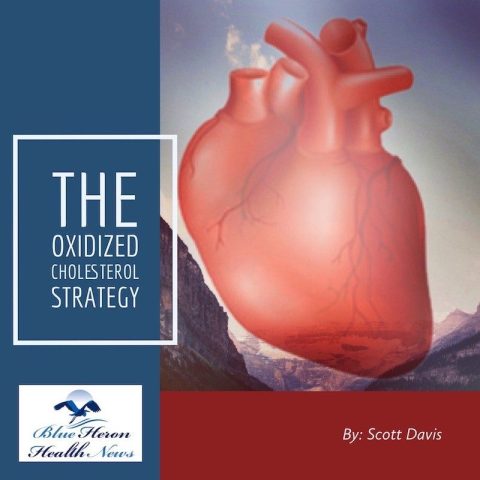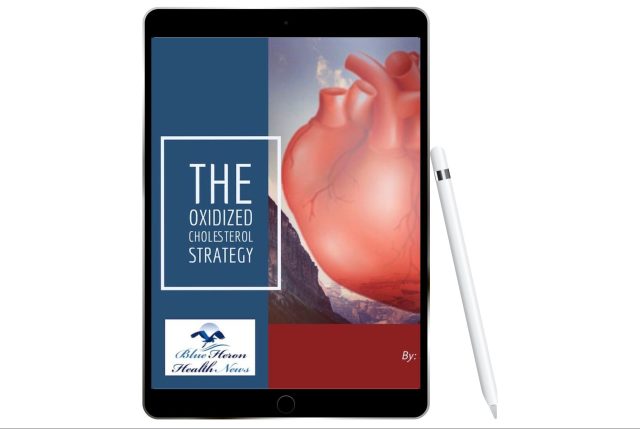How To Reduce Cholesterol Without Medication: Complete Guide 2024
By Vanessa Richards
January 10, 2024 • Fact checked by Dumb Little Man
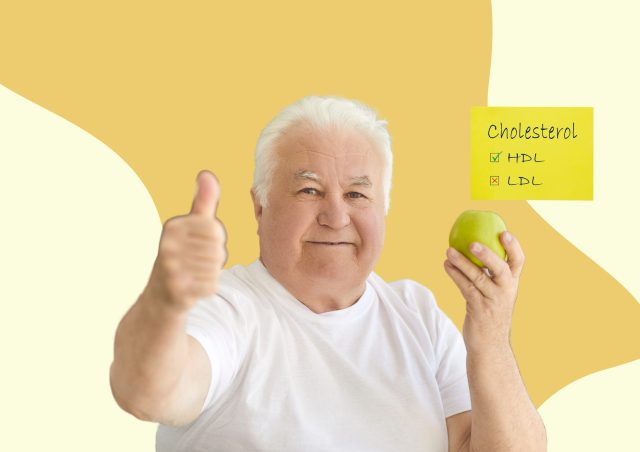
According to current data, heart disease is the number one cause of death worldwide. Heart disease has been strongly linked to many factors like old age, a family history of heart disease, smoking, excessive alcohol intake, and high cholesterol.
High cholesterol levels have been linked to a range of other diseases as well. This includes common medical conditions like strokes, type 2 diabetes, high blood pressure, peripheral artery disease, atherosclerosis, and so on.
However, despite all its negative association cholesterol is quite important and serves several vital functions within the body. Before understanding how to reduce cholesterol without medication, it’s important that more people understand the role it plays and how best to keep it within a healthy range.
Thus, in this article, we’ll look at the features, causes, and dangers of high cholesterol. We’ll also go through some natural methods you can use to lower cholesterol the natural way.
How To Reduce Cholesterol Without Medication: What is Cholesterol?
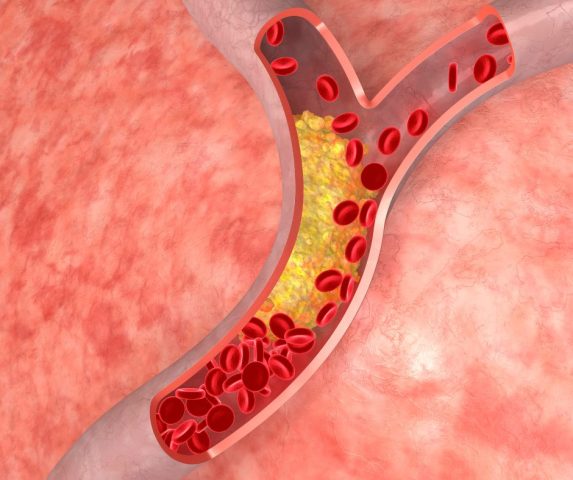
Cholesterol is a wax-like substance that is produced exclusively by the cells of animals. In humans, most of the cholesterol within the body is produced in the liver before being exported to other parts of the body. A significant amount of cholesterol is also obtained from our diet, where it is absorbed by the intestines and transported to different parts of the body, including the liver.
Cholesterol has several very important functions within the body. Some of these include:
- It is used to build new cells and repair damaged tissues.
- The molecule is used by the liver to create bile, a substance that helps your body digest fats.
- Cholesterol is the building block for producing steroid hormones like estrogen, testosterone, and progesterone.
- It helps your body produce vitamin D, which is needed for strong bones and teeth.
What are the Sources of Cholesterol?
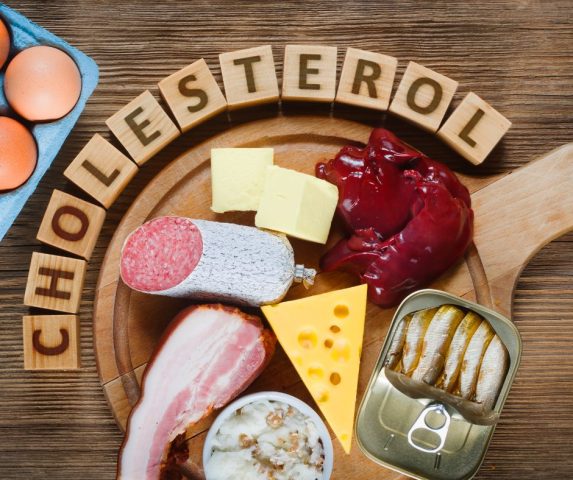
Most of the cholesterol within the body comes from two sources – your liver and the food you eat. The liver (and to some extent your intestines) produce about 75% of the cholesterol found in the blood, while the other 25% is mainly dietary.
Some foods which have a relatively high amount of cholesterol include things like:
- Cheese
- Eggs
- Shellfish
- Kidney
- Liver
- Sardines
- Full-fat dairy products
- Fried foods
- Fast food
- Processed meats
- Desserts like ice cream, cookies, pastries, and sweets.
When is Cholesterol Considered Bad?
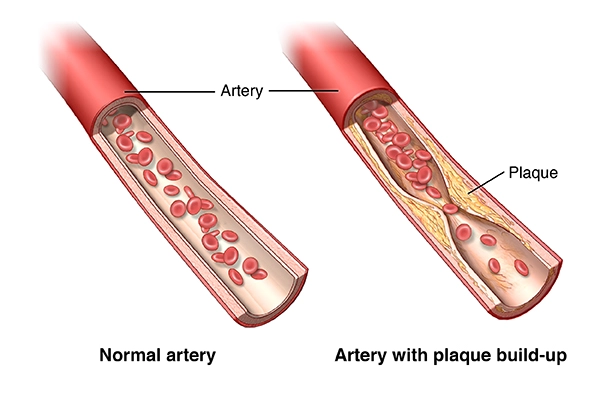
With all these great benefits, you must be wondering why cholesterol has such a bad reputation. However, most of the negative effects of cholesterol occur when your body accumulates too much cholesterol, particularly a type of cholesterol called LDL cholesterol.
To understand this, it’s important to note that there are two types of cholesterol; high-density lipoprotein (HDL) cholesterol and low-density lipoprotein (LDL).
HDL cholesterol is the type of cholesterol that is responsible for transporting extra cholesterol away from your blood vessels to the liver and helps lower your cholesterol levels. This is why HDL cholesterol is considered “good cholesterol”.
On the other hand, LDL cholesterol tends to accumulate on the walls of your blood vessels and cause plaques leading to a condition called atherosclerosis. This is why LDL is considered “bad cholesterol”.
Symptoms of High Cholesterol
High cholesterol usually does not have any symptoms and most people only discover they have the condition when they take a blood test.
Who is at Risk of Having High Cholesterol?
Since high cholesterol typically does not cause any symptoms, it’s important to know if you are at risk of developing the condition, especially later on in life. Here are a few things that can put you at risk of having high cholesterol levels.
- Your age is important since high cholesterol levels are more common in people over 40
- A poor diet that contains large amounts of trans fats and saturated fats
- Lack of exercise
- Obesity
- Smoking
- Consumption of too much alcohol
- Chronic kidney diseases
- Autoimmune conditions like lupus
- Diabetes
- HIV/AIDS
- A family history of high cholesterol levels
What are Some of the Complications of High Cholesterol Levels?
Even though high blood cholesterol levels don’t typically cause outward symptoms, over a long period they can lead to several complications like:
- Cardiovascular disease (for example, coronary artery disease, angina, heart attacks, high blood pressure)
- Strokes
- A peripheral vascular disease can lead to numbness of the legs or feet
- Gallstones
- Dementia
How to Reduce Cholesterol Without Medication

Cholesterol can be lowered with certain medications. However, many people may choose to opt out of using medications and attempt to lower their cholesterol naturally with a combination of lifestyle modifications and herbal supplements.
Natural Methods To Help You Lower Your LDL Cholesterol

Here are some natural methods of lowering your cholesterol levels.
Avoid Trans Fats and Saturated Fats
Certain fats like trans fats and saturated fat such as those found in partially hydrogenated vegetable oil, poultry skin, whole milk, cream, bacon, sausage, butter, stick margarine, certain fried foods, and a range of desserts are known to increase your cholesterol levels by increasing the amount of LDL cholesterol within your blood.
On the other hand, healthy fats like nuts, seeds, and oils from fish, soy, sunflower, canola, canola, and corn help naturally reduce your cholesterol by increasing your levels of HDL cholesterol.
Take Enough Dietary Soluble Fiber
There are two types of dietary fiber – soluble fiber and insoluble fiber. However, only soluble dietary fibers help reduce cholesterol, while insoluble forms of dietary fiber help improve gut health and bowel regularity. Most health authorities recommend that you take about 25-35 grams of total fiber a day, with at least 10-15 grams of this fiber being soluble fiber.
Certain foods are known to be rich in soluble fiber such as fruits, whole grains (like oats and barley), legumes (black beans, lima beans, and kidney beans), vegetables, sweet potatoes, hazelnuts, and flax seeds.
Get Enough Exercise
Low levels of physical activity have been linked to increased levels of cholesterol within your blood, particularly bad cholesterol. Adequate amounts of exercise have been linked to lower levels of cholesterol in the blood, better heart health, reduced risk of dementia, weight control, and other important health benefits.
The Department of Health and Human Services has recommended that at least 30 minutes of moderate aerobic activity five times a week (150 minutes a week) or 15 minutes of vigorous aerobic activity five times a week (75 minutes a week).
Quit Smoking
Smoking is known to increase your LDL cholesterol (bad cholesterol) and lower your HDL cholesterol, therefore increasing your risk of developing plaques within your blood vessels. Some smokers notice improved exercise tolerance and better physical health as soon as 2 weeks after quitting.
Maintain a Healthy Weight
Being overweight (having a BMI over 25) or obese (having a BMI equal to or over 30) is a significant risk factor for having high cholesterol and can increase the risk of dying from cardiovascular disease by up to 3 times.
You can maintain a healthy weight through regular exercise, a moderate level of regular physical activity, and a heart-healthy diet that provides the right amount of nutrients and calories (about 2500 calories for men and 2000 calories for women).
Reduce Your Alcohol Intake
Alcohol is broken down within the liver into several products, including cholesterol. Therefore, taking large amounts of alcohol can cause your levels of LDL cholesterol to rise.
Get Tested Regularly
Most health professionals recommend that all healthy adults over the age of 40 should have their cholesterol levels checked every 4 to 6 years. However, individuals with a family history of high cholesterol or medical conditions which put them at risk of having high cholesterol should be tested much more often.
Digital Program
Clears Out Clogged Arteries Naturally: Oxidized Cholesterol Strategy
The Oxidized Cholesterol Strategy is an amazing program that was created by Mr. Scott Davis in collaboration with Blue Heron Health News.
The program outlines various lifestyle and dietary modifications which can be carried out to lower cholesterol naturally without the use of medications.
It is also great for reducing blood pressure and controlling high blood sugar, two conditions that are also closely associated with high levels of cholesterol.
Shop The Oxidized Cholesterol Strategy at the Official Website.
Natural Supplements Which Help Lower Cholesterol Levels
Several supplements such as special herbs, vitamins, and minerals have been said to have important cholesterol-lowering actions. They include:
- Garlic
- Omega-3 supplements like Nature Made's fish oil and Life Extension Super Omega-3
- Berberine
- Flaxseed extract
- Green tea or green tea extract
- Niacin (vitamin B3)
- Plant stanols and sterols
>>Related Article: 11 Best Omega 3 Supplement • Top Fish Oil Products Review of 2024
Editor's Pick: The Oxidized Cholesterol Strategy
The Oxidized Cholesterol Strategy is a revolutionary program that was created by Mr. Scott Davis in collaboration with Blue Heron Health News as an effective means of lowering cholesterol naturally without using medications. The program is built on a unique theory developed by the team which believed that the cause of plaque build-up is not LDL cholesterol, but rather a form of cholesterol referred to as oxidized cholesterol.
The Oxidized Cholesterol strategy offers a 100% natural, highly-effective and safe method of lowering cholesterol through a well-designed mix of lifestyle and dietary changes such as special recipes, an exercise program, and other key pieces of health advice. It also encourages the use of certain key supplements which can help lower cholesterol like vitamins A, C, and D, lycopene, omega-3 fatty acids, dietary fiber, magnesium, and so on.
The program is designed to give you a step-by-step guide on how to avoid foods that contain trans fats and saturated fat, while also outlining healthy foods which you can use to substitute for your old diet. It also discourages activities like smoking which can increase your cholesterol.
It’s a four-week program and is guaranteed to give you positive results within a short time. The product comes as an ebook or physical resource which you can receive after a one-time purchase of $49.
Numerous positive reviews from users have affirmed that within just weeks of starting the program they could feel their health improving both physically and mentally. The program also offers a 60-day money-back guarantee if you’re not statistics with the results within this period.
Click Here to Get The Oxidized Cholesterol Strategy at Discounted Price.
Full Article: The Oxidized Cholesterol Strategy Reviews 2024: Does it Really Work?
Conclusion
Cholesterol is a very important biomolecule that performs several vital functions within our bodies. However, it becomes harmful when we accumulate too much LDL cholesterol which leads to plaques within our blood vessels.
There are several ways of lowering your cholesterol without the use of medications, which may have unpleasant side effects. These include natural changes like lifestyle and dietary changes, as well as various supplements.
In our opinion, we recommend the Oxidized Cholesterol Strategy by Mr. Scott Davis and Blue Heron Health News. It is a 100% effective, all-natural, and completely safe technique for lowering cholesterol without having to use medications.
The program is pocket-friendly, available in both physical and online format, and comes with a 60-day money-back guarantee. This is undoubtedly the best remedy to manage your cholesterol levels.
Click Here to Get The Oxidized Cholesterol Strategy at Discounted Price.
>>Related Article: How to Improve Heart Health: Complete Guide 2024
How To Reduce Cholesterol Without Medication FAQs
How often should you check your cholesterol?
Most health professionals recommend that all healthy adults over the age of 40 should have their cholesterol levels checked every 4 to 6 years.
However, individuals with a family history of high cholesterol or medical conditions which put them at risk of having high cholesterol should be tested much more often.
Why do some people have high cholesterol while others don’t?
Several factors can influence your risk of developing high cholesterol. Some strong risk factors include a family history of high cholesterol, genetics, eating a diet high in trans fats and saturated fats, being obese, not exercising enough, smoking, excessive alcohol intake, and so on.
What level of cholesterol is considered “high”?
This may be based on age, sex, and the presence of other medical conditions. However, most health guidelines consider a total cholesterol over 200 mg/dL or LDL cholesterol over 100 mg/dL as being dangerously high.
Vanessa Richards
Vanessa is a mom of 3 lovely children and a software geek. Outside of her career as a health and wellness instructor. She enjoys writing and researching on topics such as finance, software, health and culinary.

